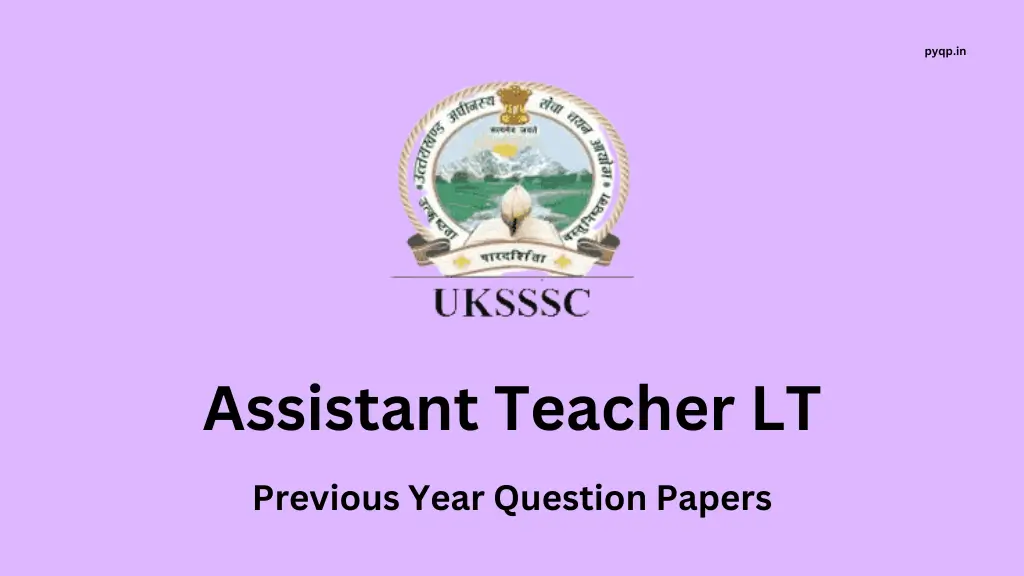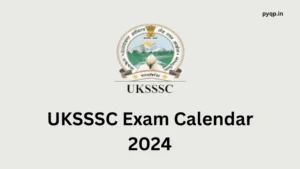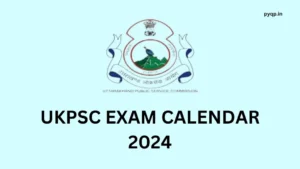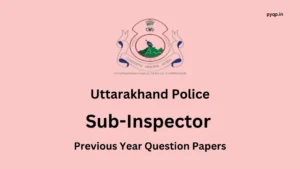UKSSSC Assistant Teacher Previous Year Papers

The Uttarakhand State Staff Selection Commission has released the recruitment notification for the post of assistant teachers in the state. This article aims on providing UKSSSC Assistant Teacher Previous Year Papers, syllabus and exam pattern as well.
Age
- Minimum Age – 21 years
- Maximum Age – 42 years
Educational Qualifications
- Graduation from any recognized university of India.
- B.Ed. OR B.A B.Ed. / B.Sc. B.Ed. And UTET / CTET Paper – II Pass
Scheme of Examination
This examination includes only one paper:
- The paper is of 2 hours.
- The paper includes Total 100 multiple choice questions (MCQ) and questions are from these subjects:
- Reasoning Test and General Knowledge
- Academic Aptitude
- Subject Specific ex: Hindi, English, Maths etc.
UKSSSC Assistant Teacher Previous Year Papers
| Paper Year | Download Links |
|---|---|
| UKSSSC Assistant Teacher General Paper Official Paper 2015 | Download |
| UKSSSC Assistant Teacher Commerce Official Paper 2015 | Download |
| UKSSSC Assistant Teacher Drawing Official Paper 2015 | Download |
| UKSSSC Assistant Teacher English Official Paper 2015 | Download |
| UKSSSC Assistant Teacher Hindi Official Paper 2015 | Download |
| UKSSSC Assistant Teacher Home Science Official Paper 2015 | Download |
| UKSSSC Assistant Teacher Mathematics Official Paper 2015 | Download |
| UKSSSC Assistant Teacher Music Official Paper 2015 | Download |
| UKSSSC Assistant Teacher Physical Official Paper 2015 | Download |
| UKSSSC Assistant Teacher Sanskrit Official Paper 2015 | Download |
| UKSSSC Assistant Teacher Science Official Paper 2015 | Download |
| UKSSSC Assistant Teacher Urdu Official Paper 2015 | Download |
UKSSSC Assistant Teacher Syllabus (Detailed)
Note: The syllabus for the common papers of assistant teacher is given below and the syllabus for the specific subjects is given in the pdf format and the download link is given below as well:
Academic Aptitude
| Unit 1 | Education and Philosophy, relationship between education and philosophy, contribution of various philosophies of education- Naturalism, Pragmatism, Idealism and Realism, educational thinkers and their pedagogical concepts- Rousseau, Plato, Aristotle, Dewey, Aurobindo, Gandhi, Vivekananda, Tagore, Gijju Bhai and Savitri Bai Phule, concept of education, training, teaching and indoctrination, functions and agencies of education, sources of education, issues and challenges of education in 2ist century, opportunities and excellence in education, aculturization and multilingualism. Role of teachers in emotional, social and national integration, Preamble of Indian Constitution, Constitutional provisions of Freedom, Justice, Equality and Fraternity, globalization, privatization, universalization and modernization of education, education and sociology, education as an investment, school as an agent of social change, teacher as a social reformer, Indian knowledge system, role of curriculum, teacher, school, family and community in value inculcation, environmental education. |
| Unit 2 | Child development, personality: types, theories, and role of teachers in personality development, intelligence: concept, theories, and measurement, measurement of aptitude, difference between aptitude and attitude, learning: concept, theories (Pavlov, Piaget, Skinner, Thorndike), and their educational implications, motivation: types and educational implications, mental health and hygiene, criteria of good mental health , role of teachers in maintaining good mental health of students, Yoga and Fit India Movement for better health, guidance and counseling: qualities of a good counselor, role of teachers as counselor and stress manager, creativity and its nurturing, ‘educational measurement and its areas, test construction: teacher made and standardized tests, uses of tests, Continuous and Comprehensive Evaluation (CCE), adjustment and its areas, case study, drama and Art in education. |
| Unit 3 | Educational Technology and its types (Hardware, software, and system analysis), Teaching – Phases of teaching, levels of teaching, Theories of teaching, Models of teaching, teaching and learning: planning, organizing, leading and controlling. Uses of Over Head Projector (OHP), Computer assisted learning, email, internet, websites, teleconferencing, e-library, e-reading and blogs. Information and Communication Technology (ICT) for innovation in teaching, training and learning; effective teaching; creating conducive learning environment; modification of teacher behavior; micro-teaching; Simulated Social Skill Training (SSST), blended teaching; team teaching, and flander’s classroom interaction analysis. ICT in: lesson preparation or lesson planning, demonstration of learning points, online and offline teaching-learning process, online assessment and examination, appropriate use of human resources. Preparation and uses of: PPT, MOOCs, e-content, e-assignment, social network for the class, e-record, open education resources, use of web 2.0 tools for learners, ICT tools for teaching, learning and assessment, Teaching Learning Material (TLM)–Audio, Visual and Audio-Visual: Role of Edusat, Gyan Darshan, PRAGYATA (Guidelines for digital education), DIKSHA in learning with the pace of learner, latest trends in technology in/for education, school internship and related aspects, action research, methods, skills, tactics, and strategies of teaching. |
| Unit 4 | Education of the gifted, delinquents, socially and economically disadvantaged children including Scheduled Castes (SCs), Scheduled Tribes (STs), minorities, backward classes, culturally and lingustically diverse, transgender, girls, etc., Gender issues- Gender equality, gender biasness, gender stereotypes, harassment and safety measures in schools , overview of girls education in Uttarakhand, educational provisions and pedagogical interventions for students with disabilities, concept, issues and practices in special education, integrated education and inclusive education, disabilities: types and causes, curriculum, classroom and infrastructural adaptations, community involvement, issue of equity, equality and quality, barriers and facilitators, provisions in National Education Policy (2020) for education of diverse group. |
| Unit 5 | School administration, its structure and schemes with special reference to Uttarakhand, Role of principal and teacher in school administration and leadership, Decision making, Planning, Controlling, Organizing, Discipline, Supervision, Hurdles and their possible solutions in teact learning process, Human Resource Management in Education. Functions of the University Grants Commission (UGC), National Council for Teacher Education (NCTE), Rehabilitation Council of India (RCI),Central ‘Advisory Board of Education (CABE), National Council of Educational Research and Training (NCERT), State Council of Educational Research and Training (SCERT), Kendriya Vidyalaya Sangathan (KVS), Navodaya Vidyalaya Sangathan ( NVS), Kasturba Gandhi Balika Vidyalayas (KGBVs), District Institutes of Education and Training (DIETS) in facilitating education, issues of: educational autonomy, accountability, and teacher absenteeism. National Policy of Education (1968), National Policy on Education (1986), Revised NEP 1992, National Curriculum Framework for School Education: 2005 and 2023 respectively, National Education Policy (2020), National Curriculum Framework for Teacher Education (2009), National Skills Qualification Framework (NSQF), Right to Education Act (2009), Rights of Persons with Disability Act (2016). Mudaliar Commission, Kothari Commission, National Knowledge Commission, Justice Verma Commission, Sarva Shiksha Abhiyan (SSA), Rashtriya Madhyamik Shiksha Abhiyan (RMSA), Samagra Shiksha, NISHTHA. |
Reasoning Test and General Knowledge
UNIT 1
NON VERBAL ABILITY TEST: Series, Counting of figures, Classification, Completion of figures, Odd figure out, Figure matrix
UNIT2
VERBAL ABILITY TEST: Alphabetical test, Coding and decoding test, Odd one out, Series completion test, Order arrangement, Blood relation test, Problems based on age
UNIT3
GENERAL KNOWLEDGE:
Uttarakhand: State profile and Historical background, Bio diversity, Population, Ancient, medieval and modern Uttarakhand
India: Indian states, Prominent books and their authors, Main scientific discoveries, Renowned scientists, Prominent awards, Education, national symbols, Famous religious places, Prominent sports and related terminology


